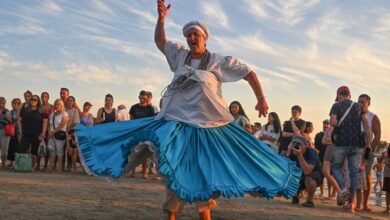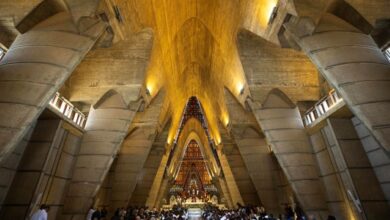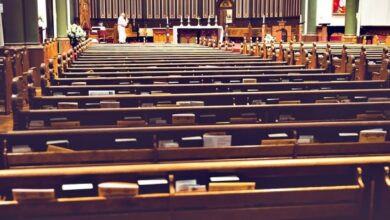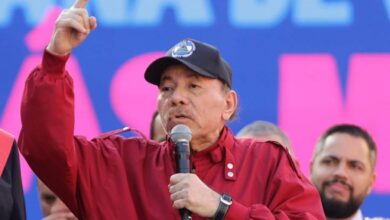Nicaragua: The Conflict Between Daniel Ortega And the Catholic Church Grows
The political and social crisis in Nicaragua has had a visible contender just as powerful as Daniel Ortega's regime: The Catholic Church, which has caused discomfort in the Executive of the Central American country .

Photo: FB-Diocese of Matagalpa
LatinAmerican Post | David García Pedraza
Listen to this article
Leer en español: Nicaragua: Crece el conflicto entre Daniel Ortega y la Iglesia Católica
Nicaraguan society has been immersed in social and political problems for more than four years due to the power of the Executive of Daniel Ortega, president of the country from 2007 to date (elected for the first time for the period 1985-1990). The Sandinista leader has grabbed the headlines lately thanks to the controversial presidential elections held in 2021, where, through the excessive use of his powers, he imprisoned all the leaders and candidates opposed to his government, and also expelled the OAS from the country. and withdrew Nicaragua early from it. However, this organization had been intensifying its actions against the controversial Ortega government for some time by denouncing the political persecution of the opposition and disqualifying the recent elections.
You may also be interested in: Gallery: The Most Relevant Native American Personalities
The historical opponent of Daniel Ortega (and his political current)
Since the beginning of Sandinismo in Nicaragua, from whom Daniel Ortega claims to have his governance inspiration, there has been an opponent from civil society, the Catholic Church, which, for more than 40 years, has had certain frictions with Ortega's ideology and currently with the actions that the government has taken to try to repress the religious institution.
The persecution of the clergy has been evident since 2018 when the political crisis was just beginning. The Catholic Church, by taking the lead in the peace talks between the Ortega government and its opponents, did not receive a good gesture from the Executive because Ortega thought that the meetings were unbalanced since the Church has been a constant critic of his government plan, for which the dialogues did not prosper and thus the Nicaraguan crisis continued its course.
The so-called 'National Dialogue', by failing to demonstrate the Executive's willingness to change, increased the feeling of insecurity in the country, so much so that the UN and the OAS called for a solution to the internal conflict through more meetings between opponents and supporters of Ortega. However, the president of the nation dismissed any action because he considers that the Church shelters terrorists in its cathedrals and temples, a discourse that continues to be repeated to this day.
Delegitimize the opponent as the only recourse
Earlier this week, the Church experienced another blow of persecution by the Ortega government by ordering the closure of six religious stations, the executive alleging the lack of operating permits that have not been updated since 2003 by the Nicaraguan Institute of Communications (Telcor), specifically informed the Diocese of Matagalpa. However, the curia considers that it is a measure of censorship because last June a Catholic television channel was taken off the air by the same institution without valid arguments.
According to the last census carried out in 2015, 48% of the Nicaraguan population considers itself Catholic, for this reason the bishop of Matagalpa, Rolando Álvarez, despite the fact that only approximately half of Nicaraguans follow him, spoke to the entire population of the country and exhorted: " Continue to bend your knees, next Thursday, the day of the holy Curé of Ars, praying for the protection and sanctification of priests and on Friday, August 5, a day of fasting and prayer, because prayer will save Nicaragua".
For her part, the lawyer Patricia Molina Montenegro, who is part of the Observatory for Transparency and Anticorruption, in her report 'Nicaragua, A Persecuted Church? (2018-2022)', compiles the almost 200 attacks that this institution has suffered by the Ortega government, in addition to expressing Molina for the Catholic portal AciPrensa that Daniel Ortega and his wife, and vice president of Nicaragua, Rosario Murillo, persecute the Church to a personal, non-governmental method, in addition to expressing that 'The Catholic Church is not willing to flatter anyone', which possibly offends Ortega and his narcissism.
The Vatican has not recovered from the expulsion of the Apostolic Nuncio's envoy last March, in which it considered the action by the Nicaraguan government to be "serious and unjustified." In addition, the secretary of the Pontifical Commission for Latin America, Rodrigo Guerra, referred to the situation of the Church in Nicaragua, quoting Pope Francis when he said: "Neopopulism is the use and abuse of the people in moments of fragility, of popular uncertainty. , to come to power and stay in it''.
Finally, a siege by officials of the Divine Mercy Church in Sébaco increases Ortega's show of power against the religious congregation, adding to the expulsion of the religious community of the Missionaries of Charity a month ago, and the current censorship suffered by religious media on radio and television.
It is not common for the Catholic Church to be persecuted in Latin America, as it is the most Marian cultural region (devoted to the Virgin Mary) by population percentage. Attacks on this religious congregation are more common in West African countries, such as Nigeria, and in the Middle East, such as Egypt and Iraq. However, when power allows a person or organization to stalk anyone they deem to be an enemy, no prayer can stop their ability to oppress.




